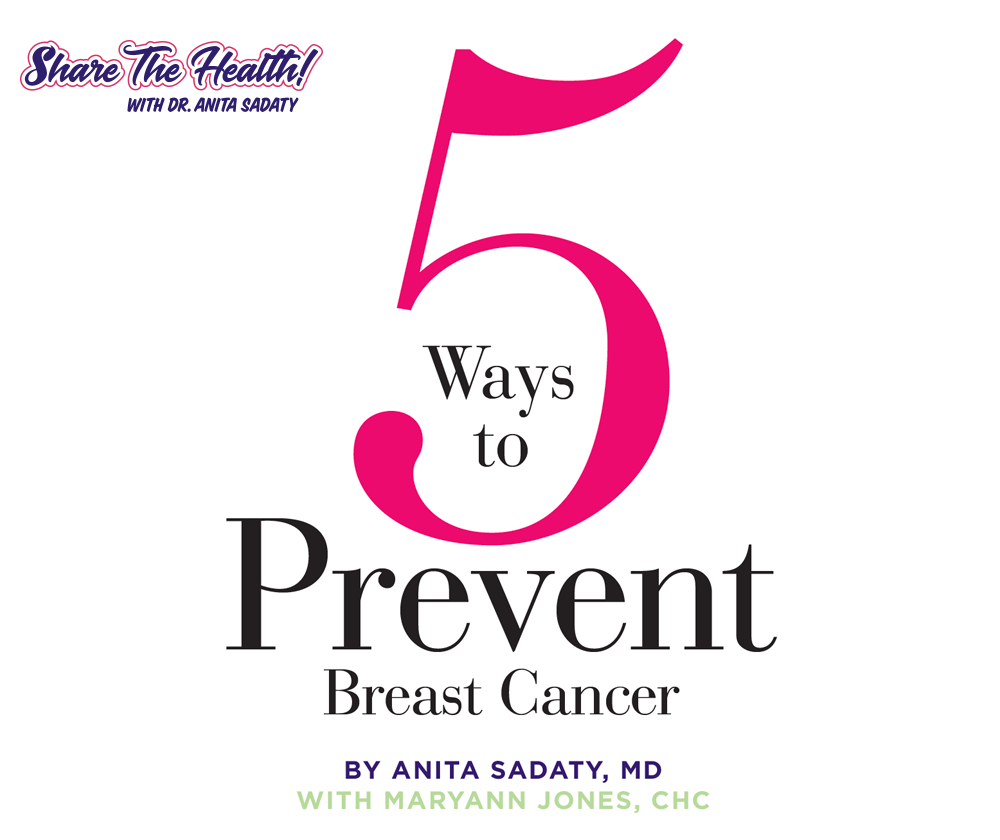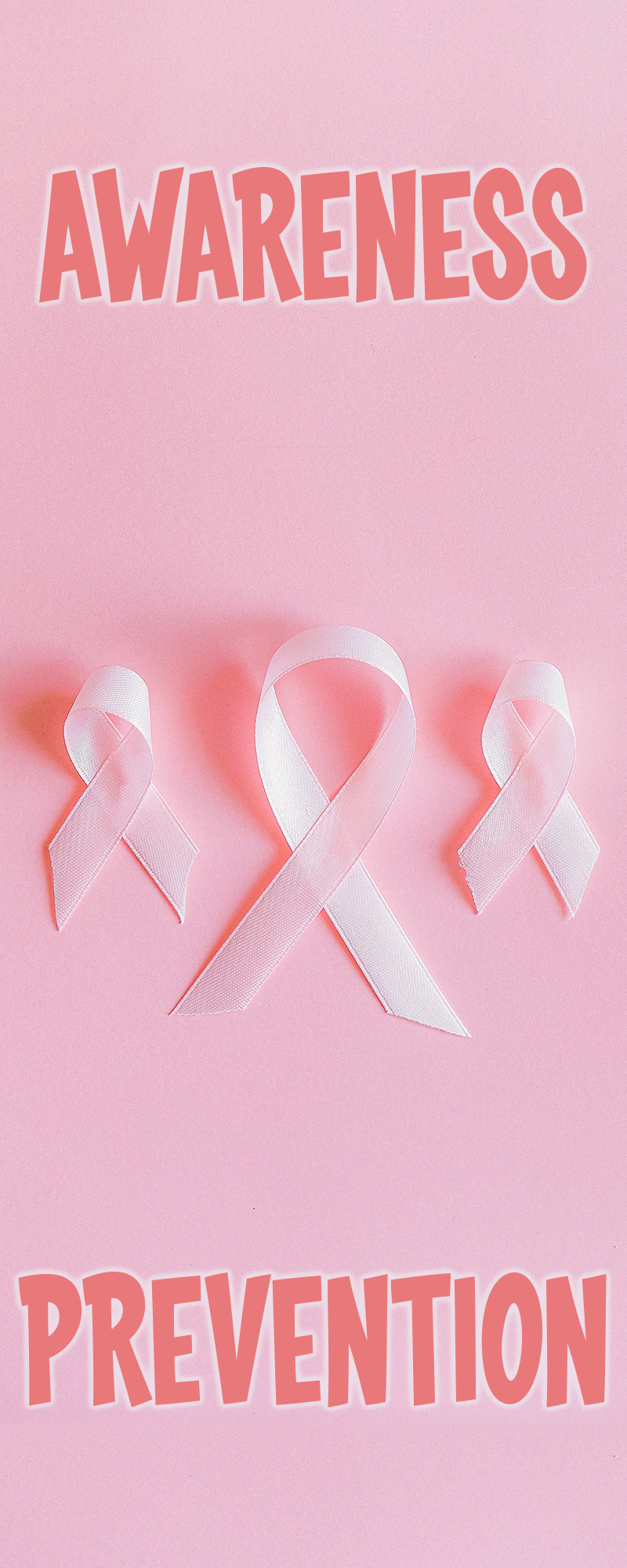
Take Action & Prevent Breast Cancer
Five simple, daily steps to reduce your risk of breast cancer by 30% despite the risk factors of genetics, environment and age…
➔ YOU ARE POWERFUL and you have the ability to prevent getting breast cancer
➔ YOUR BODY has an amazing capacity to heal and restore on its own given the right tools and tender loving care
➔ YOU DO NOT have to get breast cancer because your mom or aunt or sister did
➔ YOU CAN BE YOUR OWN HEALER – Please take the time to do these five action steps every day to prevent breast cancer
Early Detection Is Not Prevention
Relying solely on mammography, ultrasound, annual clinical breast exams or MRI technology to detect cancer early is not the same as getting to it before it begins. These are important methods for earlier detection but they don’t take the place of your personal efforts to prevent cancer from developing.
Breast cancer rates have risen 20% worldwide in the last 7 years and is now the leading cause of cancer deaths among women.
1 in 8 women will receive a breast cancer diagnosis in their lifetime.
Prevent Breast Cancer With Five Action Steps
ONE — Move: Make time for 30 minutes of moderate, break-a-sweat, exercise
- Shoot for 150 minutes a week
- RISK REDUCTION: 25-30%
TWO — Nourish: Include cancer-fighting powerhouses into your daily diet
- OLIVE OIL: 4 tablespoons
- COLOR: 8-10 servings of colorful fruits and vegetables
- Prioritize a variety of veggies with at least 1 serving from the cruciferous family which includes broccoli, cauliflower, kale, Brussel sprouts, and cabbage
- Max fruit servings to 2 to 3
- GREEN TEA: 3 small cups
- FIBER: 25 grams minimum
- RISK REDUCTION: 20-40% depending on the studies
THREE — Play: 15-30 minutes of sun exposure to the face and arms boosts vitamin D levels and is the equivalent of taking 3000 IU of vitamin D daily
- Aim for vitamin D blood levels above 40 and ideally above 50
- Get at least 200 mcg of vitamin k2 daily
- RISK REDUCTION: 30-50%
- According to one study, vitamin D levels above 40 were associated with a 50% decreased risk of breast cancer compared to women with blood levels below 40
FOUR — Hydrate: Minimize alcohol intake to none or at most 1-2 glasses/week
- RISK AWARENESS: 3-6 glasses of wine/week increases your risk by 20%
- Each glass above 6 increases your risk by 10%
- Women who had 2 drinks daily had a 51% greater risk compared to those who never consumed alcohol
FIVE — Revive: Reduce highly processed, sugary food
- MINIMIZE anything in a bag or box that doesn’t require refrigeration
- CHOOSE WHOLE FOODS like whole fruits and vegetables, meat, chicken, fish, nuts, etc.
- RISK AWARENESS: Women with the greatest intake of sugar had a 19% increased risk compared to women who consumed the least amount of sugary foods

More Ways To Thrive
ATTAIN AND MAINTAIN A HEALTHY WEIGHT — Calculate your body mass index (BMI) using online tools then get support and take steps to reach your goal weight.
MINDFULNESS / AWARENESS / RESILIENCE — Bring attention to your wellness with daily reminders that prioritize prevention.
Resources:
- Lynch BM. Physical activity and breast cancer prevention: Recent Results Cancer Res 2011;186:13-42 (A large review of 73 studies found that breast cancer risk was reduced by 25% amongst physically active women as compared to the least active)
- Cohen SS. Sedentary behavior, physical activity and likelihood of breast cancer among Black and White women. Cancer Prev Res 2013 Jun;6(6): 566-76. (African American women who engaged in vigorous physical activity >2hours/week had a 64% reduced risk of breast cancer compared to those who did not.)
- Gandini S. Meta-analysis of studies on breast cancer srisk and diet: the role of fruite and vegetable consumption and the intake of associated micronutrients. Eur. J. Cancer 2000;36:636-646 (Women who consumed 25 or more servings of cegetables weekly had a 37% lowerrisk of breast cancer compared to women who consumed fewer than 9 vegetable servings weekly)
- 2015 JAMA study: Mediterranean diet and invasie breast cancer risk among women at high cardioascular risk in the PREDIMED trial (Meditarranean diet plus 4 tablespoons of extra-virgin olive oil had a 68% decreased risk of breast cancer compared to women on a low fat diet.
- Inoue, M Regular consumption of green tea and the risk of breast cancer recurrence Cancer letter 167(2): 175-82
- Dong JY Dietary fiber intake and risk o breast cancer: a meta-analysis of prospecive cohort studies. Am J Clin Nutr. 2011; 94(3):900-905 (A metaanalysis of 10 prospectivecohort studies showed that for every 10 grams of fiber/day increase, there was an associated 7% reduction in breast cancer risk)
- Garland, C. What is the dose-response relationship between vitamin D and cancer risk? Nutrition Reviews 65 (8): S91-S95
- Fiovannucci E. Vitamin D andCancer Incidence in the Harvard cohorts. Ann Epidemiol. 2008 (The women in the Nurses’ Health Study observed a 30% reduction in risk of breast cancer comparing the higheest with lowest quintiles of 25 OH vitamin d levels)
- Chen WY. Moderate alcohol consumption during adult life, drinking patterns and breast cancer risk. JAMA 2011;306(17):1884-1890. (Consuming as little as 3 to 6 drinks/week was associated with increased bresat cancer risk, and women who had at least 2 drinks daily on average had a 51% greater risk of breast cancer compared to those who never consumed alcohol)
- Hamajima N. Alcohol, tobacco and breast cancer—collaborative reanalyi=sis of individual data from 53 epidemiological studies including 58,515 women with breast cancer adn 95,067 women without the disease. Br J Cancer 2002; 87 (11): 1234-1245
- Tavani A. Consumption of sweet foods and breast cancer risk in Italy. AnnOncol. 2006;17(2):341-45
Please Share the Health if you liked what you read!!!
For more information about my wellness programs and my practice, check out my website drsadaty.com. Hey Look! You are already here…
Ready for the legal disclaimer? Information offered here is for educational purposes only and does not constitute medical advice. As with any health recommendations, please contact your doctor to be sure any changes you wish to consider are safe for you!